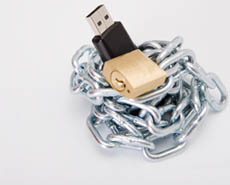Network security gets the lion’s share of the press, but an often overlooked part of data security architecture revolves around the use of USB drives. As the capacity of these devices continues to soar, more and more data is going mobile. But that convenience is a double-edged sword that also carries with it the danger of loss or theft, and the resulting potential for a disaster. Kingston, a brand already well-known for its multitude of award-winning flash storage solutions, recently introduced its latest ultra-secure USB drive, the Data Traveler 6000 (DT6000). This device offers an incredible array of safeguards: FIPS 140-2 Level 3 validated No passwords stored on device or host Utilizes elliptic curve cryptography (ECC) Drive locks down, encryption key self-destructs after 10 intrusion attempts Secure channel communication Enforced complex password Tamper-proof physical security barrier If you don’t know what some of that means, take my word for it – this device provides amazingly robust protection for data. The DT6000 is also built to survive rough handling – the casing is titanium-coated stainless steel and the drive is waterproof up to a depth of four feet. But is there a need for such rigorous flash drive security standards in the business world at large? Kingston gears its sales pitch toward government organizations and financial institutions that routinely move sensitive data and customer files. As sales director Nidhi Sethi noted at a recent DT6000 launch event: “Establishing security policies and deploying USB products that prevent data loss is as important and immediate as an organization’s network security. Using non-secure USB drives makes organizations vulnerable to data loss and breaches that can affect the company’s credibility with its employees, customers, and partners. The DT6000 is the most secure USB flash drive available and will meet...

